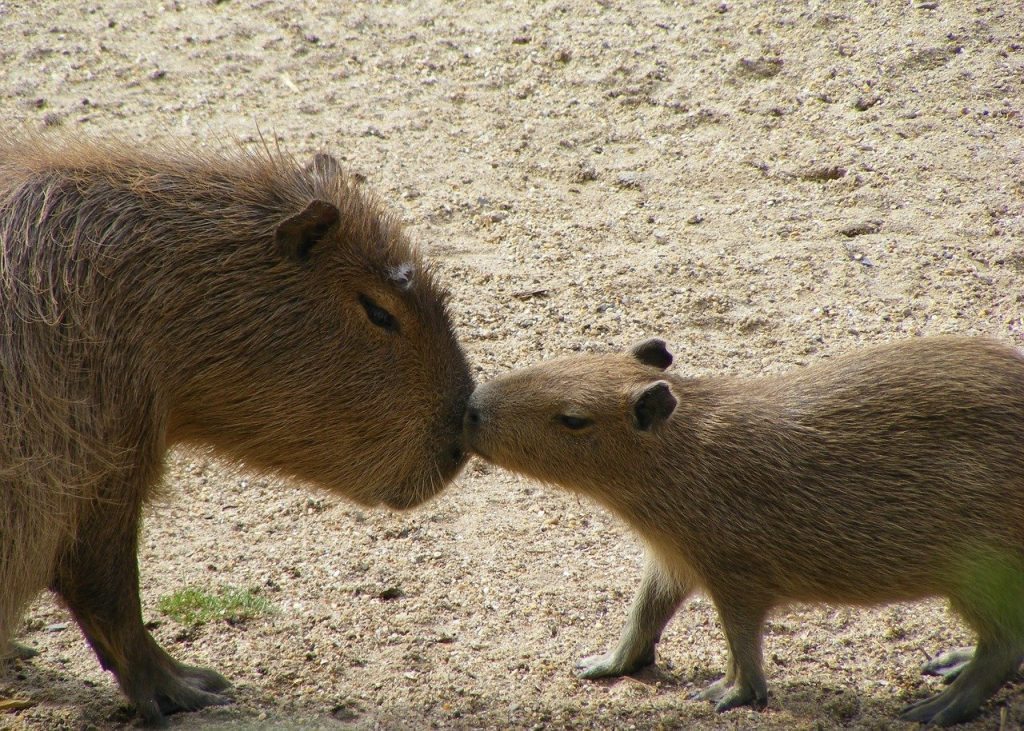
The Adorable Duo

There is nothing quite as heartwarming as witnessing the bond between a baby capybara and its mother. These gentle creatures, native to South America, are the largest rodents in the world. With their cute round faces and chubby bodies, baby capybaras are simply irresistible.

Caring for the Young

When a baby capybara is born, it relies heavily on its mother for care and protection. The mother capybara is incredibly nurturing and dedicated to her young. She is always by their side, ensuring their safety and providing them with warmth and comfort.

Milk and More

Just like any other mammal, baby capybaras need milk to survive and grow. The mother capybara produces milk rich in nutrients to nourish her offspring. In addition to milk, the mother also introduces her babies to solid foods as they get older, teaching them how to forage for vegetation.

Exploring the World

As the baby capybara grows stronger and more curious, it starts to explore its surroundings under the watchful eye of its mother. Together, they venture out to discover the lush vegetation and water sources that sustain their diet. The mother capybara teaches her young how to swim and navigate through different terrains.

Social Creatures

Capybaras are highly social animals, and this trait is evident in the relationship between a mother and her baby. The mother capybara introduces her young to the rest of the group, which usually consists of other adult females and their offspring. This allows the babies to interact with their peers and learn important social skills.

Protection in Numbers

Being part of a larger group provides added protection for the baby capybaras. The adults keep a close watch on the little ones, ensuring their safety from potential predators. If any danger arises, the entire group will quickly come together to defend the vulnerable members, including the babies.

Growing Up

As the baby capybara grows older, it becomes more independent but still maintains a strong bond with its mother. The mother capybara gradually allows her offspring to explore and forage on their own while keeping a close eye on them. This process helps the young capybaras develop the necessary skills to survive in the wild.

Playtime

Play is an essential part of a baby capybara's life. It not only helps them develop their physical abilities but also strengthens the bond between the mother and her young. The capybara babies engage in playful activities, such as chasing and splashing in the water, under the watchful eye of their doting mother.

Life Lessons

The mother capybara serves as a teacher to her young, imparting important life lessons. She shows them how to identify safe feeding areas, recognize potential threats, and communicate with other capybaras. These lessons are crucial for the survival and well-being of the baby capybaras as they grow older.

A Mother's Love

The bond between a mother capybara and her baby is incredibly strong. The mother's love and devotion are evident in the way she cares for and protects her young. She is always there to comfort them, provide warmth, and ensure they are well-fed. This unwavering love forms an unbreakable connection between them.

Incredible Adaptability

Capybaras are known for their adaptability to different environments, and this trait is passed down to the offspring. With the guidance of their mother, baby capybaras learn to adapt to various habitats, ranging from dense forests to grassy plains. This adaptability ensures their survival even in challenging conditions.

A Delicate Balance
The presence of baby capybaras is a positive indication of a healthy capybara population. However, maintaining a delicate balance between their numbers and the available resources is essential. With proper conservation efforts and protected habitats, these adorable creatures can continue to thrive in their natural environment.

Fascinating Creatures

The world of capybaras is truly fascinating, and the bond between a baby capybara and its mom is just a glimpse into their captivating lives. These gentle giants, with their endearing nature and strong family ties, have captured the hearts of many wildlife enthusiasts. Their presence in the wild is a true wonder to behold.